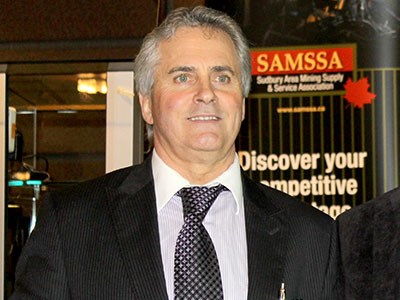Rick Lemieux is no stranger to starting up businesses. The founder of RDH Mining Equipment in Sudbury, Rock-Tech and the Saenchiur Flechey Resort on Lake Nipissing knows what it takes to make a fledgling business grow into a successful one.
In March, he shared some insights with aspiring entrepreneurs at Aboriginal Business Day in North Bay. The event was sponsored by Nipissing-Parry Sound: The Business Centre and the Labour Market Group.
With a straight-forward delivery, interspersed with humour, Lemieux outlined the basic convictions he has followed to make a business successful.
“Follow your dreams, and like what you do. If you are thinking of going into business, what makes you an expert?” he said. “Make sure you have a passion for what you are going to do.”
He found out at a young age that he was mechanically inclined and living on a farm provided him with opportunities for repairing machinery. Prior to starting RDH Mining Equipment in 1984, he worked for a company for 10 years and built up a list of contacts. When the company went bankrupt, those contacts were essential for his plan to strike out on his own.
He sold RDH in 2011.
Planning and forecasting are essential when starting a business but a contingency plan is needed. If the first plan fails, a backup might be required.
“You always need to have a plan B,” he said.
He sold Rock Tech five years ago, but decided to shut down another of his companies, MTS.
Three months after closing the mine tunnelling company, the industry picked up.
“Sometimes you can only do so much and you have to make some hard decisions,” Lemieux said.
Some decisions business owners make aren’t always easy, such as when it is necessary to let some staff go when business has slowed.
“At work, you can’t be a friend to everybody. Laying off in hard times is not easy, but it has to be done. You have to be prepared to do that,” he said.
It’s important to keep track of finances at all times, even if the company consists of just one person, so a financial controller is necessary.
“When you are a one-man or three-man operation, you are too busy doing the work and not watching your dollars. You think you are making money but you lose track of how much is going out and how much is coming in.
“Every week you need to know about your money. But if you are doing work and not getting paid, you are not going to make it.”
A simple habit Lemieux has used is keeping a pad and pen beside his bed. When he thinks of something he should do, he writes it down immediately.
“You have to be an innovator and always think ahead. At night, when you think of something, write it down. When you wake up the next day, you will know you were thinking of something but can’t remember it unless you write it down,” he said.
Investing in some advertising is essential in getting known. Although satisfied customers may help by word of mouth, he said not to rely on just that method.
“Take two or five per cent every pay and use it to go out and get your customers. If you are a small company, get in the want ads. It takes a long time to get known and get ahead.
“A client won’t talk about you if you do a good job. You can use him as a reference, but don’t expect him to spread the word. His job is to do his job. If you didn’t do a good job, then he will talk about you. And then everyone will know,” Lemieux said.
Treating customers well must be front and centre for all business owners. Remain flexible and adaptable when dealing with customers and never break a promise.
“If you can’t come when you promise, he will get someone else or he won’t trust you. If you say you will be there, be there and do it. And do it right,” he said.
Build relationships by getting to know customers and clients by taking the time to talk about things other than business. Dropping in on clients just to “say hello” can also make a difference.
“Always remember, the customer is always right, even if he is wrong. When he leaves, you can talk about him,” Lemieux said to laughter. “He is always right and just deal with it. Maybe he is having a bad day, but you are serving him. You have to help him with his problems and talk to him.
Click here for more articles on Rick Lemieux.




